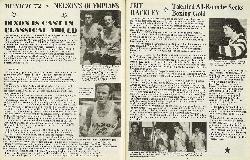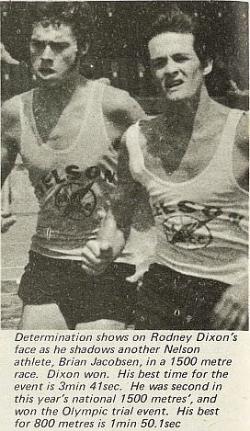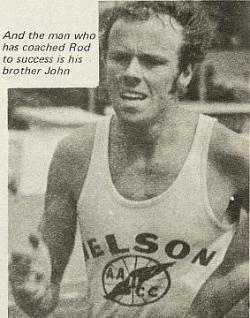6
Munich '72 Nelson's Olympians
Dixon is Cast in Classical Mould
Consistency, spiced with touches of brilliance, appears to be the main ingredient of middle distance runner Rodney Dixon.
By stepping onto the Olympic 1500 metre track, Dixon will be in the shadow of many great athletes: Elliott, Snell, Keino and Lovelock, to name but four who have won the 1500 metres' gold. Whether he will be remembered among those past heroes remains to be seen.
When Dixon recorded 3min 59.6sec for the mile, at Lower Hutt, the 21-year-old insurance inspector became the ninth New Zealander to break the barrier. But he had been mighty close on several occasions before that, and among his efforts were 4min 0.lsec, 4min lsec and 4min 2sec for the mile. These times indicate his consistency and, with the tremendous build-up in his preparation for Munich, his chances of a medal are not remote.
Ambitions
From an early age Rodney Dixon has had two main ambitions, as far as athletics were concerned — to wear the silver fern as a N.Z. representative, and to break four minutes over a mile. He has realised both: As a member of the national team in the world cross-country championships in Spain, where he was 10th, and his 3min 59.6sec mile in Hutt.
Rodney's rise in New Zealand athletics has been due, in no small measure, to his 24-year-old brother John, who coaches him. As a schoolboy, Rodney was keen to get into hard training. But brother John dissuaded him.
"Bide your time," was the advice he tendered. And Rodney did just that. Not until he was 18 did he begin training seriously.
Success came gradually. Rodney followed a second placing in the national junior cross-country championship (he was 30th the previous year) with a win in the junior mile, in 1968. His time was 4min 19sec. To celebrate his last day as a junior, he won the Skellerup Steeples event in 1969. He followed up with a third in the Wellington centre senior cross-country championships, against international veterans Bryan Rose and Barry Everitt, and was 15th in the national event, soon afterwards. In 1970 he realised his ambition for a New Zealand blazer. After a fifth in the national cross-country championships, he was second in the trials to select the team for the world championships in Spain. On that tour he was second in the Belgian championships, as well as his 10th world placing, and he returned from the tour to claim the 1971 national cross-country title.
Tall and wiry (he stands close to 6ft 2in), Rodney Dixon is built in a classical middle distance mould. He is dedicated to, but not dominated by, athletics and is tremendously confident in his brother's coaching.
As his athletics graph continued on its upward trend, it was obvious that Dixon had strong chances of Olympic selection. Before his selection was announced he said failure to gain selection would not daunt him. "I love running too much to let a disappointment get me down," he said.
Dixon's successes have not gone unnoticed overseas. Three American universities — San Diego, New Mexico and Oregon — have offered athletic scholarships. The offers have been declined, but New Mexico, the university being attended by another New Zealand athlete, Rex Maddaford, has kept its offer open.
"It's a hard decision to make," he said. "Opportunities like these could set me up for life."
But, so far, Rodney is sticking to his brother's advice of several years ago. "Bide your time."
And that could be good advice for one of the most exciting of New Zealand's athletic prospects.
Determination shows on Rodney Dixon's face as he shadows anotherNelson athlete, Brian Jacobsen, in a 1500 metre race. Dixon won. His best time for the event is 3min 41sec. He was second in this year's national 1500 metres', and won the Olympic trial event. His best for 800 metres is 1min 50.1sec
And the man who has coached Rod to success is his brother John





